14 min read
10 Best Free Property Management Software Platforms in 2025
Whether you run two rental properties or 50, staying up-to-date on everything those units need can be exhausting. Balancing the financial side...

Have you ever noticed how different you feel depending on your environment? A clean and organized space may make you feel more productive and put together, while a cluttered and dirty environment can make you feel scattered and anxious. Studies have shown that the amount of clutter you have in your home can greatly impact your well-being.
As Billy Roberts, a licensed therapist at Focused Mind ADHD Counseling, says: “Living space can directly impact mood and anxiety. With increased clutter or disorganization in a person’s personal living space, it can feel like there is no safe place to recover from life.”
With one in five U.S adults experiencing mental illness, optimizing your rental for mental health is not only important but necessary for maintaining a positive state of well-being. Whether you’re a landlord or a tenant, we’ve gathered tips from mental health experts so that you can improve your rental and promote better mental health and overall well-being.
In a sense, your living space is an extension of yourself. It’s where you can showcase your sense of style and create a space that’s truly yours. It’s also meant to be a safe haven, where you can relax, unwind and be yourself. Licensed Doctor of Psychology, Aniko Dunn, explains: “Crowded spaces make our minds crowded. Studies show that stress affects your mood and may cause you to feel anxious and depressed. Keeping your interior clean and orderly supports emotional well-being and balance.”
Clutter and disorganization aren’t the only things that can cause a living space to negatively impact your mental health. It turns out that a place that doesn’t feel familiar or comfortable also affects mental health. Psychotherapist Jesse Rothberg states, “When your home is cluttered, uncomfortable, or just doesn’t feel like you, it can feel impossible to settle in.”
With that being said, it’s important to not only keep your space clean and clutter-free, but you’ll also want to personalize your space and make it feel like home — whatever that means for you. Keep reading for tips on how to support mental health and make the most of your rental, whether you’re a landlord or tenant.
For tenants, it can sometimes be a challenge to make a rental feel like home. There’s only so much they can change in a rental property to make it feel like a personal oasis, but there are plenty of ways to implement changes for better mental well-being. Try incorporating these tips from mental health experts to optimize your rental and have a well-suited environment for yourself or your tenants.
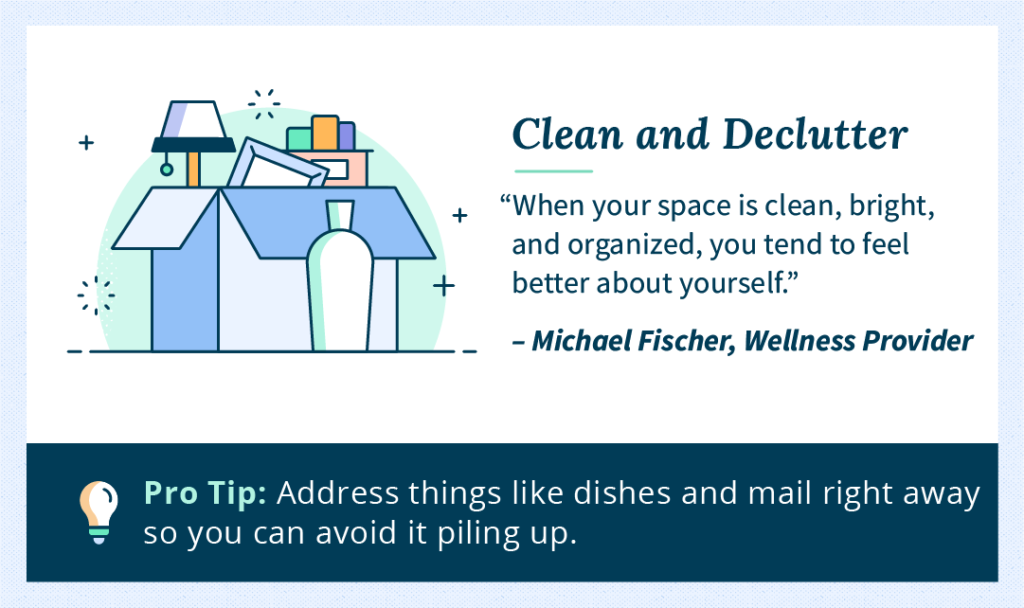
Physical clutter not only takes up space in your home but in your mind as well. According to a study performed on a panel of 1,000 people across the U.S, a clean and minimalist living space can help increase positive emotions and alleviate depression.
“When your space is clean, bright, and organized, you tend to feel better about yourself,” Michael Fischer, founder of EliteHRT explains. “If your room is constantly messy, it may mean you are exerting so much time and energy into stressful things that you don’t even have time to clean, but having an unclean and unkempt space can cause more stress and mental health issues in the long run.”
A simple yet effective way to keep your home clean and clutter-free are to address things such as mail, dishes, or laundry to avoid them from piling up. As a landlord, provide extra storage space so tenants can store unused items out of sight.
If your rental is small, it can be easy for it to become crowded and cluttered. Choosing functional furniture for the space makes it easier for those who live there to achieve that clean and clutter-free look.
“Multi-functional furniture can save money and space and can help transform a room into a different function.” explains Aniko Dunn. “Invest in smart, attractive furniture to suit your needs.”
Some great multi-functional furniture options for small spaces include ottomans with hidden storage, convertible couches, or retractable tables. You can also use these furniture items as alternatives to workout equipment.
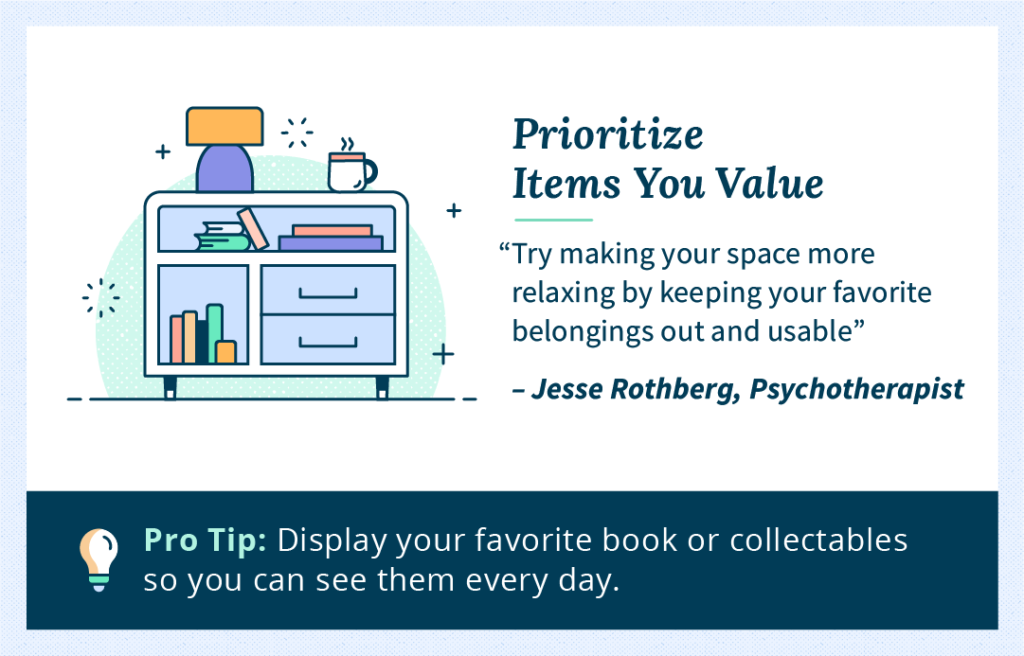
Surrounding yourself with objects that you love is an important part of making your rental feel more comfortable and familiar. It’s what makes a house a home so don’t forget to add personal touches to make your space feel like you.
As psychotherapist Jesse Rothberg explains, “Happiness and comfort are found in small things like your favorite mug, or a blanket that smells like your favorite perfume. Try making your space more relaxing by keeping your favorite belongings out and usable.”
Display your favorite books on a coffee table or a photo gallery of all your favorite memories with friends and family so that you see them every day.
It’s no secret that being around houseplants can make us feel better. A 2018 study conducted by the University of Pennsylvania showed that just being near natural greenery can greatly improve mental health. Therapist Cinnamon Johnson goes on to explain, “Having a lot of green plants can improve your mood. Especially since green is a color that brings balance emotionally.”
When it comes to picking out houseplants, you can’t go wrong. “You will never have too many houseplants,” Aniko Dunn states. “Indoor plants can brighten a room, bring a place to life and help enhance your overall health and well-being. Swiss Cheese Plant, Rubber Plant, Kenta Palm, and Peace Lily are just a few suggestions.”
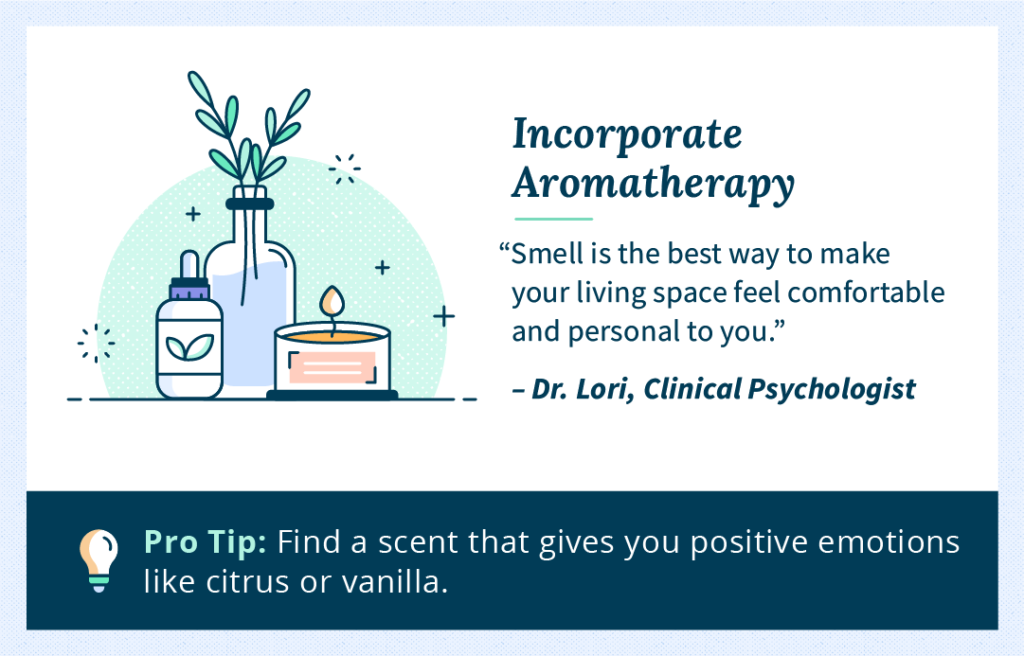
Smell is one of the most powerful senses we possess as it directly affects how we feel. Studies have shown that odors people like make them feel good while odors that they dislike make them feel bad. Clinical psychologist Dr. Lori states, “Any type of mechanism that releases a pleasing smell can shift an ambiance and render the space to have a specific ‘feel’ based on the olfactory stimulation.”
She goes on to say, “Smell is the best way to make your living space feel comfortable and personal to you. Different smells can trigger different emotions, so finding a scent that is positive and then finding ways to ensure your house smells good is a great way to enhance a living space.”
Use scented plug-ins, candles, essential oil diffusers, or incense to make your rental feel like home. What’s considered a calming scent varies from person to person, but some great options include cheerful citrus or a comforting vanilla fragrance.
The walls in a rental tend to be a bit bland since it makes it easier to appeal to potential tenants. Look at it this way: a plain wall is a blank canvas you have the ability to decorate and make your own. As a tenant, there’s only so much you can do to your rental walls, but Aniko Dunn recommends adding removable wallpaper to help enhance your space.
“There are so many stylish designs available to buy, usually non-abrasive and with the action of ‘peel and stick’ which can be removed and rearranged as often as you like” she says.
For landlords, try painting your rental walls a calming color such as a light shade of blue or green. This will help your space feel more bright and relaxing.
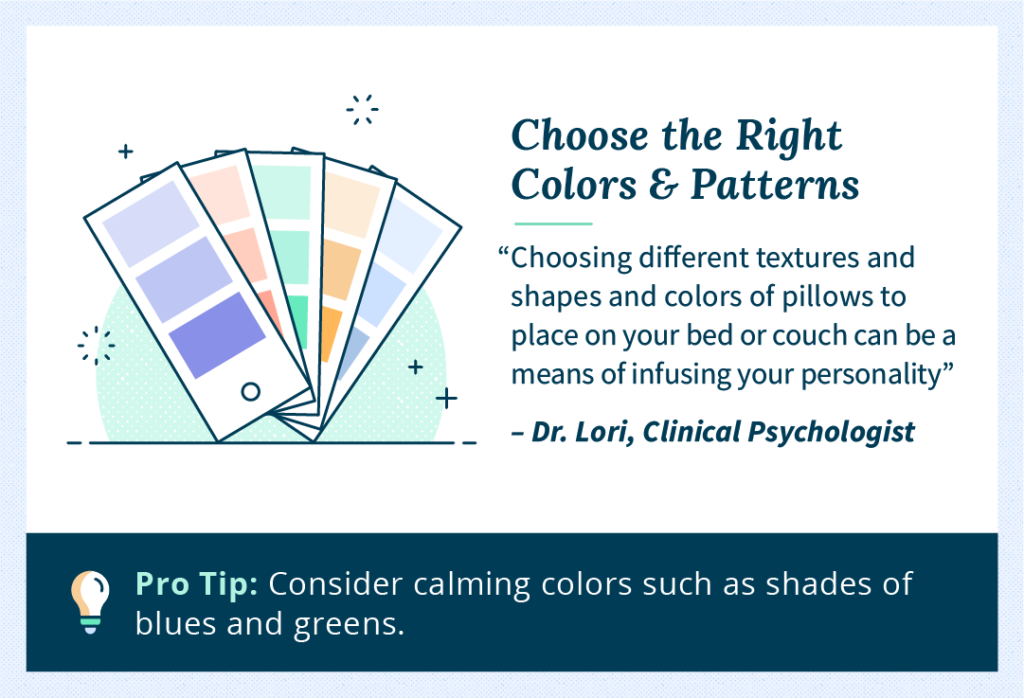
One of the simplest ways to optimize your rental for better mental health is by decorating with the right colors and patterns. There are so many ways you can add your favorite colors and patterns into your space, whether it be wall art, dish towels, curtains, or throw pillows.
“Choosing different textures and shapes and colors of pillows to place on your bed or couch can be a means of infusing your personality,” says Dr. Lori. “Adding a favorite soothing color or creating a dimension with texture makes a space feel like your own.”
One of the best things you can do to your living space to enhance your well-being is to bring in as much natural light as possible. Studies have discovered that the more sunlight we’re exposed to, the more serotonin we produce. However, some rentals don’t provide enough windows or they are located in areas that are prone to gloomy weather.
Aniko Dunn says, “If you lack natural light, consider putting some lights in a corner of the room.” This will help brighten those dark corners and make your living space feel less dreary. Michael Fischer also points out, “There are plenty of things people can do to make their space better for their mental health without major renovations, including buying lamps that simulate the sun, especially in areas that experience more rain.”
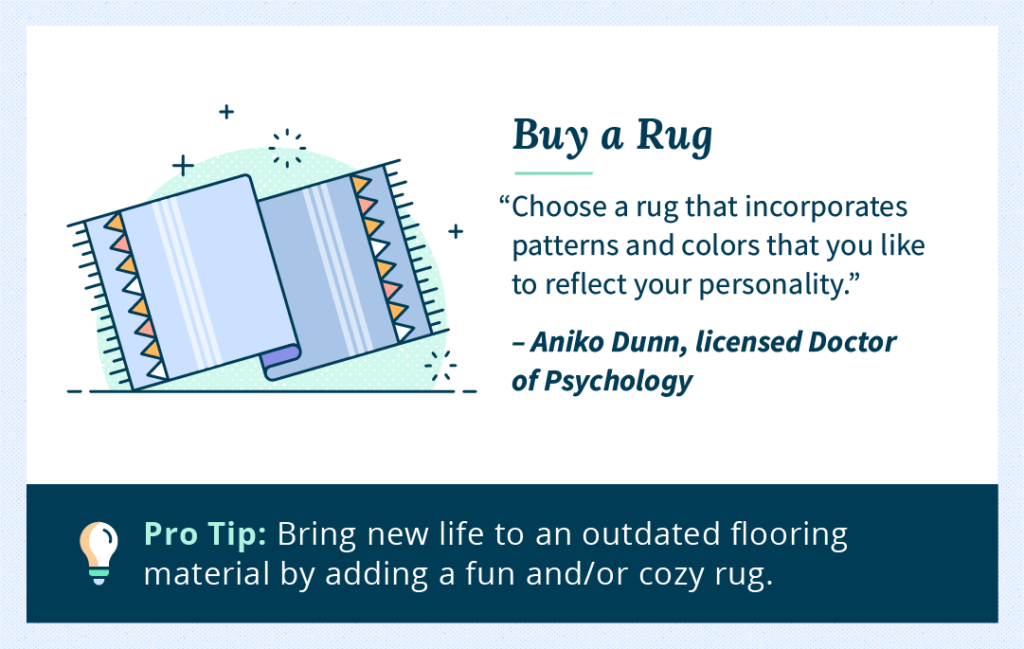
Just like the walls of your rental may need some sprucing up, so do the floors. From dull carpets and wood floors to cheap linoleum, you can invest in a nice rug to add some color and personality. “A rug can correct certain flaws and change the look of a room,” says Aniko Dunn, “Choose a rug that incorporates patterns and colors that you like to reflect your personality.”
If you’re a landlord, replacing floors can be expensive. Adding a rug to outdated floors is an easy and affordable way to spruce up your rental and make it feel more comfortable and homey.
For those who struggle with their mental health, a little positivity can go a long way. Sometimes you need those little reminders that you’re loved and valued, and that everything is going to be okay. A simple yet effective way to incorporate positivity into your everyday life is by displaying positive notes around your living space.
When asked about tips on how to create a happy living space, Dr. Lori suggests leaving positive quotes in common areas of your home. “Quotes can be written on post-it notes and placed on your bathroom mirror or refrigerator,” she says. The simple act of reading and saying positive affirmations will encourage you to believe them and build confidence to make them come true.
To get you started, try one of these daily positive affirmations — display them around your home or on a vision board.
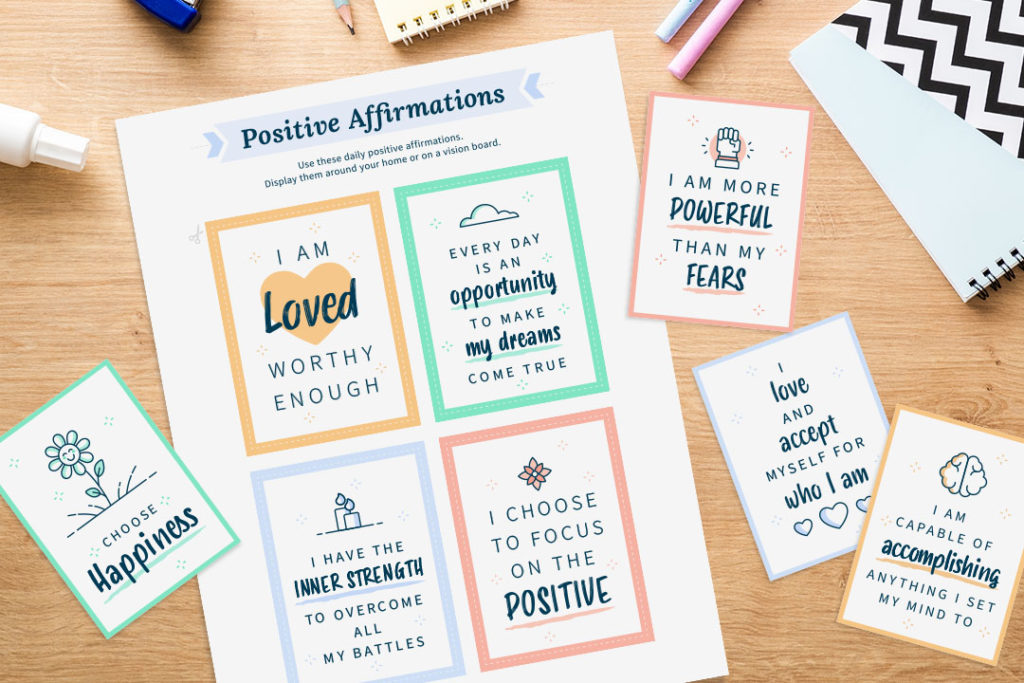
Maintaining a strong and respectful relationship with your tenant is always important, but especially if they struggle with their mental health. While there are personal aspects that are out of your control, there are ways to engage with your tenant that will be very helpful to promote positive communication and mental well-being for everyone involved.
Use these expert tips on how to keep your tenant’s mental health in mind so that you can maintain a positive landlord and tenant relationship.
For those who struggle with serious anxiety, thorough and friendly communication from a landlord can make a positive impact. Licensed therapist, Billy Roberts, states, “Landlords should recognize the impact of their response time on someone with a mental health struggle. Sometimes what makes the biggest impact on anxiety or depression is just knowing the landlord cares and is on top of things.”
Not only is excellent communication a must for landlords, but so is kind and respectful engagement. “Engaging with kindness and respect is important,” says Dr. Lori. “By understanding behaviors within the context of compassion, a landlord can best serve their tenant.”
As a landlord, it’s up to you to decide whether or not you want to allow pets in your rentals. However, not only do many renters on the market have pets, but those who struggle with their mental health may have an emotional support animal. “[Ease up on] your ‘no-pet’ policies if the tenant has emotional support or a service animal prescribed by their doctors,” says Aniko Dunn.
Since a person’s living space has such a strong impact on their mental health, it’s important as a landlord to be accommodating of rental unit changes if necessary. Licensed mental health counselor Melissa Bailey suggests that, “Landlords can be accommodating to renters’ desires to paint in calming colors.”
As a landlord, it’s not your job to be your tenants’ therapist or counselor. Sometimes it can be hard to know exactly how to deal with certain situations regarding a tenant who may be struggling with their mental health. Aniko Dunn advises, “Always seek professional advice before providing support to ensure that you provide appropriate support and advice to your tenants.”
Whether you’re a landlord or a tenant, knowing how your living space affects mental health is an important step in providing a better environment for yourself and potential renters. Check out our tenant screening and rental application pages for help finding the perfect tenants for your rentals.
14 min read
Whether you run two rental properties or 50, staying up-to-date on everything those units need can be exhausting. Balancing the financial side...
11 min read
For some landlords, completing the eviction process doesn’t always conclude the interaction with the evicted tenant. After proceeding through an entire eviction,...
13 min read
If you’ve built up equity in a rental property and are low on cash reserves, it might feel impossible to start home...
Join the 700,000+ independent landlords who rely on TurboTenant to create welcoming rental experiences.
No tricks or trials to worry about. So what’s the harm? Try it today!